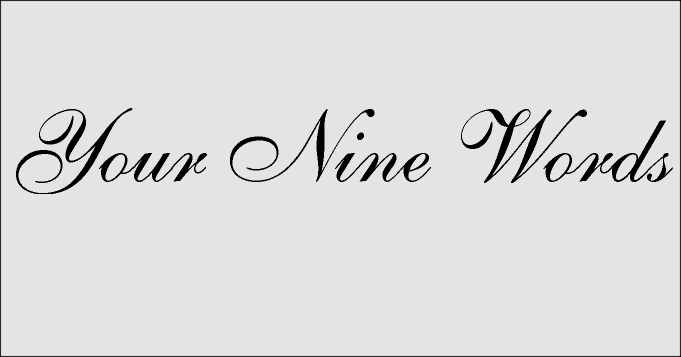
What happens when someone asks you what you do?
Do you break out in a cold sweat? Do you launch into a long pre-prepared reply? Do you change the subject? Do you look at the person in front of you as if you had never been asked such a question before?
Picture this situation. You are attending a training programme. The coffee break arrives. People stand near you with their cups in their hands and ask you what you do. Are you ready for this question? How much can you say before you notice the other people have stopped listening?
You have about as much time as it takes you to get nine words out. After that your listener begins to switch off.
Lots of people miss the opportunity that has just been given to them, when they are asked what they do. Many people mutter and mumble. They look at their shoes. They say something mundane. When you are in this sort of situation, how well do you do?
Choosing Your Words
It is amazing just how few people know what to say when asked what they do. They are answering a question which they know will regularly come up. Yet, they fail to engage in a conversation with someone else about themselves.

You know you have limited time to make that first impression and get a conversation started, but you do not have your conversation starters ready. Most people do not have any idea how to sustain a conversation without focusing too much on themselves.
What is important is not to think about encapsulating everything you do into a few words or coming up with a smart catchphrase. What you want to say is something that will get the response:
“That’s interesting. Tell me more.”
Whatever you say, make it SHORT and relevant to your role in your organisation. Make sure what you say is interesting to your listeners. Oh, yes, and do it in nine words.
How You Get Things Wrong
You rush your response!
You know the spotlight is on you, when you are asked what you do. You know you are in a situation for which you have probably not prepared adequately, even though you know you should have, so you take a run at what you say.
You probably say too much.
You start talking about the detail of your job. You avoid eye contact with every one as you speak. You go on and on. If you keep speaking, the other person cannot ask you any more questions. In the end he or she edges away from you.
That is bad news for you.

You are your own worst enemy here. It is difficult enough to get people’s attention in the first place.
Doing anything that detracts from your message about yourself or discourages people from talking to you is damaging to you and your career.
However, there is a simple solution.
Solving The Problem
Plan your responses to questions about what you do before attending the training programme. Plan and learn. Create those nine words three or four times so you can use different responses in different circumstances.
Be concise with your answers. If you are, more people will be interested and stay in a conversation with you longer. That is because they have a chance to speak, too. You will be more popular as a result. You may even make some good contacts.
In my case I often say I write career-oriented books for ambitious people. I remember to say:
“How many of them have you read?
“Have you read my latest book on (subject)……”
I also use variations of my LinkedIn professional headline in these situations:
Creator of eye-catching online profiles plus bestselling career-oriented books to help professionals succeed at work.
If I have nine words I say:
“Helping you to succeed by building your personal brand.”
That almost always generates a question.
“What do you mean?” That gives me permission to offer another sentence. (No more)
The question for you to consider now is: what are your nine words and how will you use them to enter into a conversation.
My LinkedIn Profile:
